#Publiccloud
Explore tagged Tumblr posts
Text
Public Cloud là gì? Giải pháp đám mây linh hoạt cho doanh nghiệp hiện đại
Public Cloud là mô hình điện toán đám mây nơi hạ tầng được cung cấp công khai qua Internet, cho phép người dùng triển khai dịch vụ nhanh chóng, mở rộng linh hoạt và tối ưu chi phí. Đây là lựa chọn phổ biến cho startup, doanh nghiệp chuyển đổi số hoặc cần triển khai dịch vụ quy mô lớn mà không đầu tư hạ tầng riêng.
Đọc chi tiết: Public Cloud là gì?

0 notes
Text
How Public Cloud Is Transforming E-commerce

The e-commerce industry is growing at an unprecedented pace, and much of its success is driven by technological innovation. One of the most transformative technologies reshaping how online businesses operate is public cloud computing. From improved scalability and cost-efficiency to faster innovation and better customer experiences, the public cloud offers a powerful foundation for modern e-commerce platforms.
Unlike traditional IT infrastructures, public cloud computing provides a flexible and cost-effective way to store data, host applications, and deliver services over the internet. This allows online retailers—regardless of their size—to compete on a global scale.
Scalability for High Traffic Seasons
E-commerce traffic is unpredictable. From festive sales to flash promotions, online stores must handle huge spikes in traffic without crashing. With traditional servers, scaling for demand can be expensive and time-consuming. But public cloud platforms like AWS, Microsoft Azure, and Google Cloud allow businesses to scale resources automatically based on traffic.
For example, during Black Friday or Diwali sales, an online retailer can scale its application and infrastructure in real-time—only paying for the extra resources when needed. This ensures that customers enjoy smooth shopping experiences even during peak demand.
Reduced Infrastructure Costs
Maintaining physical servers, cooling systems, and security requires a significant financial investment. Public cloud computing eliminates the need for expensive hardware and data centers. Instead, e-commerce businesses pay only for what they use, significantly reducing operational costs.
With cloud service providers offering various pricing models—such as pay-as-you-go or reserved instances—businesses can optimize expenses while maintaining performance.
Faster Deployment and Innovation
In today’s competitive e-commerce landscape, speed is everything. Businesses must quickly launch new products, features, or entire marketplaces. Public cloud platforms offer ready-to-use tools, APIs, and microservices that allow developers to build, test, and deploy applications in hours instead of weeks.
Additionally, features such as continuous integration and deployment (CI/CD) pipelines streamline development workflows, helping businesses innovate faster and respond to customer needs promptly.
Enhanced Data Security and Compliance
Security remains a top concern for e-commerce platforms, especially when handling customer data and payment information. Public cloud computing providers invest heavily in cybersecurity infrastructure and offer advanced features such as:
End-to-end encryption
Multi-factor authentication
Automated backups and disaster recovery
Compliance certifications (PCI-DSS, GDPR, ISO, etc.)
These built-in protections ensure that e-commerce businesses maintain customer trust and meet regulatory standards without having to manage everything in-house.
Personalization Through Data Analytics and AI
Personalized shopping experiences drive higher conversion rates. Public cloud platforms enable e-commerce businesses to collect and analyze massive amounts of user data in real time. Using cloud-based AI and machine learning tools, businesses can:
Recommend products
Predict customer behavior
Optimize pricing strategies
Automate inventory management
Cloud-based analytics platforms like Amazon Redshift, Google BigQuery, and Azure Synapse allow businesses to make data-driven decisions that enhance user engagement and boost sales.
Global Reach and Accessibility
The public cloud gives e-commerce companies a global presence without the need to set up physical infrastructure in every region. Cloud providers operate data centers worldwide, allowing businesses to:
Deploy applications closer to users
Improve website load times
Offer localized content and currency
Comply with data residency regulations
This global reach is particularly valuable for small and mid-sized online retailers aiming to expand into international markets.
Seamless Integration with Third-Party Tools
Modern e-commerce platforms rely on a wide range of tools—from CRM systems and payment gateways to shipping APIs and marketing automation tools. Public cloud computing makes it easy to integrate these services seamlessly through APIs and containerized microservices.
This modular approach simplifies operations, enhances agility, and makes it easier to switch or upgrade services as the business grows.
Sustainable and Eco-Friendly
Many public cloud providers have committed to renewable energy usage and sustainable operations. By migrating to the cloud, e-commerce companies contribute to reducing their carbon footprint. Centralized cloud data centers are more energy-efficient than traditional on-premise systems, making cloud adoption a step toward greener business practices.
Final Thoughts
Public cloud computing is not just a trend—it is a foundational shift in how e-commerce businesses operate, grow, and compete. From scaling effortlessly and cutting costs to enhancing security and offering personalized customer experiences, the cloud empowers online retailers to focus on what they do best: delivering value to their customers.
As cloud technologies continue to evolve, the future of e-commerce will become even more agile, intelligent, and globally accessible. Now is the time for businesses to embrace the power of the public cloud and unlock their full digital potential.
#PublicCloud#CloudComputing#EcommerceSolutions#DigitalTransformation#OnlineRetail#AWS#Azure#GoogleCloud#CloudForBusiness#ScalableTech#RetailTech#EcommerceInnovation#careerintech
0 notes
Text

Don’t Miss Out – Class Starts TOMORROW!
🌐 Master SAP S/4HANA Public Cloud Implementation in Just 2 Weekends! Your SAP Cloud Career Breakthrough Starts NOW!
Cloud is the future—and leaders will shape it. Be one of them. Join our LIVE weekend-only training led by top SAP expert Vikram Fotani and gain real-world implementation skills that set you apart.
🗓 Dates: 3rd, 4th, 10th & 11th May 2025 🕒 Time: 3:00 PM – 5:00 PM IST 💻 Mode: 100% Live Online Interactive Sessions
🎯 Who Should Attend? ✔ SAP ECC / S/4HANA Consultants (FI, MM, SD, etc.) ✔ Functional & Technical SAP Consultants ✔ Project Managers & Team Leads ✔ Ambitious Freshers ready to break into SAP Cloud
💡 What You’ll Gain: ✅ Real-world SAP Public Cloud Implementation skills ✅ Hands-on demos, guided tools, and step-by-step walkthroughs ✅ Career strategies from an industry-leading expert ✅ Lifetime access to session recordings & materials ✅ Certificate of Completion to showcase your expertise
💺 Seats are filling fast – This is your last chance to save and upgrade your future!
🎓 Register Now & Be Cloud-Ready: 👉 Secure Your Spot: https://www.gauravconsulting.com/product-page/sap-s-4hana-public-cloud-implementation-training
📩 DM us or WhatsApp: +91 9158397940 🌐 Visit: www.gauravconsulting.com
🚀 Invest 8 Hours. Unlock Endless SAP Cloud Opportunities. Be the consultant everyone wants on their team.
#SAP#saps4hana#publiccloud#sapcareers#cloudtraining#VikramFotani#LiveSAPTraining#WeekendBatch#CareerUpgrade#GauravConsulting#DigitalFuture#upskillnow
1 note
·
View note
Text







#DidYouKnow
These Cloud Security Best Practices?
Swipe left to explore!
💻 Explore insights on the latest in #technology on our Blog Page 👉 https://simplelogic-it.com/blogs/
🚀 Ready for your next career move? Check out our #careers page for exciting opportunities 👉 https://simplelogic-it.com/careers/
#didyouknowfacts#knowledgedrop#interestingfacts#factoftheday#learnsomethingneweveryday#mindblown#cloud#cloudservices#cloudsecurity#iam#cloudencryption#security#breaches#privatecloud#publiccloud#ddos#cyberattack#cloudserver#didyouknowthat#triviatime#makingitsimple#learnsomethingnew#simplelogicit#simplelogic#makeitsimple
0 notes
Text
Dell APEX File Storage For Azure: Unlock Your AI Potential

Use Azure’s APEX File Storage to Unlock AI Innovation. Cloud storage for AI workloads is made easier and more efficient with the new fully managed version of Dell APEX File Storage for Azure.
Synergy Between Your Data, AI, and Public Cloud
Companies are drowning in inputs from edge devices, content production, and consumer data. They are using new AI approaches to find hidden insights, forecast trends, and spur development in order to stay afloat. However, the demands on IT infrastructure increase along with data quantities.
Businesses might choose to use AI tools and services and exploit the public cloud system. Having high-performance cloud storage is essential to realizing this promise.
Purpose-Built for AI: Dell APEX File Storage for Microsoft Azure
Dell and Microsoft worked together to create APEX File Storage for Azure, a cutting-edge public cloud architecture intended to maximize data access, processing, and analysis for AI-driven applications like computer vision, natural language processing, and predictive analytics, in response to the growing need for high-performance, scalable storage solutions suited to AI workloads. It was first introduced as a Customer Managed service, but it will now also be offered as a fully managed Dell solution.
By combining the unmatched scalability and flexibility of Microsoft Azure, a top global provider of public cloud services, with the storage performance, operational consistency, and enterprise-class data services from Dell, the #1 NAS solution provider, it have developed a smooth and potent environment for handling the enormous data demands of AI workloads. This enables businesses to decrease complexity, speed up AI model training, and extract more value from their data.
Take Your Cloud Journey to the Next Level with APEX File Storage for Azure
Without requiring you to restructure your storage infrastructure, the Customer Managed and new Dell Managed service versions offer streamlined data mobility, operational consistency, and enhanced performance.
With the same user-friendly interface, API interfaces, and identity management that you are currently used to with PowerScale, you will have a familiar user experience once you are in the cloud. This simplifies overall complexity by cutting down on the amount of time spent managing data and infrastructure.
You can operate workloads on the public cloud with confidence and without sacrificing quality with to a strong suite of enterprise-class capabilities, including as native replication, snapshots, CloudPools, Quality of Service (QoS), multi-protocol access, and data reduction technologies. This implies that you may concentrate on promoting innovation rather than handling complication.
APEX File Storage and native Azure features integrate seamlessly to let you get the most out of Azure. This direct connectivity allows Azure services like Azure Machine Learning, Azure Data Factory, Azure Cognitive Services, and Azure Synapse Analytics easier to use and enables advanced data processing, real-time analytics, and intelligent applications. Lowering latency, boosting data availability, and enhancing operational efficiency lets you respond quickly to changing business needs. Additionally, by offering a consistent method for managing cloud workloads and storage, the integration streamlines management.
With two service options Customer Managed and to recently launched Dell Managed that strike a balance between customization and use, discover the unmatched versatility of APEX File Storage for Azure. Utilize Microsoft Azure Consumption Commitment (MACC) for expedited purchase and swiftly deploy with Azure Marketplace.
Unveiled at Microsoft Ignite 2024, the new Dell Managed version offers a simplified experience that frees up IT personnel to concentrate on important projects. You can be sure that your storage infrastructure is modern and optimal when Dell takes care of deployment, monitoring, maintenance, and updates. To anticipate that this solution, which was developed in close cooperation with Microsoft, will offer the best scalability and performance density available. It will be readily deployable through the Azure portal and immediately deployed within your company’s Virtual Private Cloud (VPC) in the public cloud environment when it launches in the first half of next year.
Earlier this year, to released the Customer Managed version, which is intended for businesses that require unique setups. You may customize the solution to fit your particular requirements by having fine-grained control over the architecture, design, deployment, scalability, and infrastructure. With the best performance at scale for AIII, it can accommodate up to 18 nodes and 5.6PiB in a single namespace. Additionally, a Terraform module is used for auto deployment and management, which streamlines the procedure and lessens administrative strain.
It devotion to meeting client demands, supported by Dell’s commitment to providing outstanding support and service, is what further distinguishes APEX File Storage for Azure. The proactive support service has a 97% customer satisfaction record and offers highly skilled professionals around-the-clock, every day of the year. In order to guarantee effective deployment and best utilization of cloud resources, generating long-term value, to Dell Professional Services team provides knowledgeable advice and customized support.
Read more on govindhtech.com
#DellAPExFileStorage#Azure#AIPotential#AItools#Cloudstorage#naturallanguageprocessing#AImodel#publiccloud#AzureMachineLearning#technology#technews#VirtualPrivateCloud#VPC#news#govindhtech
1 note
·
View note
Text
Benefits of Cloud Computing
Cloud computing has revolutionized the way organizations handle data, whether it is storing or processing data. Now that the world is moving towards digitalization, cloud computing is playing an important role. In this article, we will explore some of the benefits of cloud computing.
Scalability --Fluctuating Workload: As organizations’ demands fluctuate from time to time, cloud computing offers to adjust their IT resources by scaling up or down as per their demands. This plays an important role in saving costs and using IT resources as necessary. Now, organizations don't have to think about the limitations of their physical infrastructure; rather, they can access unlimited storage, computing power, and IT resources as per their demand. --Switching Storage Options: The organization can choose any storage option, Public, Private, or Hybrid, and can also change these options according to its demands. This is particularly beneficial for start-ups as they can start small in their uncertain growths. Now they can start small-scale rapidly as per their evolving needs.
Elasticity --Resource Control: Cloud computing offers unparalleled elasticity. It allows organisations to maintain performance without overprovisioning resources. This also allows organizations to deploy new applications, which can help innovate and respond to market changes. AceCloud is an OpenStack-based cloud that assesses resource usage, views active virtual machines, and helps gain visibility. --Adaptation of Changes: An organization might use cloud-based databases, virtual machines, and machine learning tools, all from a single provider, which can help get a customized solution for their changing needs. This allows organizations to adapt to changing requirements and take advantage of the latest technologies. --Choices Control: Organisations can choose the control level with IAAS, SAAS, or PAAS.
Cost Efficiency Pay-as-you-go: Cloud computing's biggest benefit is cost efficiency. It is a pay-as-you-go model, i.e., organisations pay only for the resources they have consumed. Traditionally, businesses paid high fees for physical servers, data centers, and IT infrastructure, which included purchasing hardware, maintaining it, and assigning it to staff for management. However, this feature of cloud computing not only helps minimize upfront costs but also reduces maintenance expenses, which cannot be found in traditional storage methods. For example, with AceCloud, organisations can choose a pay-as-you-go option to rent servers, networks, VMs, OS, and other on-demand IT resources.
Effective Collaboration --Real-time Data Access: Cloud computing allows a team to collaborate effectively regardless of its members' physical location. This service provides real-time access to data and applications, which helps in effortlessly communicating with partners, employees, clients, etc. --Anytime, Anywhere: A person who has access to the cloud can share files, conduct video conferences, and manage projects in a remote location, which increases efficiency and speeds up the decision-making process.
Disaster Recovery Disaster recovery and backup were very difficult in traditional methods of storage. companies relied on on-premises backup systems for backups and disaster recovery, which required high investments in purchasing and maintaining these resources. Sometimes, these resources would lead to hardware failure, human errors, natural disasters, etc., which are used to destroy the backup. --Easy Backup: Cloud computing is a totally different and easy approach for getting the backup. In cloud computing, data is stored in multiple locations to ensure its safety. Companies can ask their service providers to recover data. They will be easily provided with the backup in almost no time. This method is cost-effective and reliable. AceCloud is an OpenStack-based cloud service that builds redundant and scalable data storage. The stored data can then be used, retrieved, and modified. --Automated Backup: Cloud service providers offer automated data backup and recovery services, which help organizations restore data quickly on their own.
Security In the era of increasing cyber threats, security has become the top issue for all-sized business organizations. Traditional methods make security difficult to achieve. --Data Encryption: Cloud providers are investing heavily in the security of client data and offering a multi-layered approach to security that includes encryption, access controls, and continuous monitoring of data transitions. --Threat Detection Tools: Cloud providers often offer advanced threat detection tools to identify and eliminate potential security breaches. Organizations can also implement identity and access management controls, to ensure only authorized persons have access to data and applications. --High Security Standards: To gain organizations' trust, cloud providers also maintain security standards such as GDPR, HIPAA, etc., so clients can be confident that their data is being handled securely and according to necessary legal requirements.
Global Accessibility --Global Approach: Cloud computing helps organizations expand their business globally. Now, organizations can reach and serve their customers globally without the need for physical infrastructure. Most cloud providers offer data centers in multiple regions, which allows business to access their services closer to their users. --Multiple Data Centres: AceCloud has 10+ Data Centres. Organizations that have a diverse customer base or work in multiple countries can benefit from cloud computing, as it provides consistent experiences and essential services to users regardless of their location.
Environmental Sustainability --Reduced Carbon Footprints: As we talk about green earth, traditional methods lack sustainability. However, cloud computing is a greener technology than traditional IT methods. Carbon footprints and use of energy can be reduced to 90% by moving to cloud computing. --Energy Efficient: Traditional methods use a huge amount of energy to power and cool down their server. Cloud computing, on the other hand, uses advanced cooling techniques, renewable energy sources, and energy-effi cient hardware to minimise their carbon footprints and harm to the environment.
Quality Control Reduced Human Errors: Quality and consistent reporting play a crucial role in determining success. Sometimes, human error can be made, and incorrect data may be stored, or data may be absent, cloud computing reduces the risk. In cloud computing, the data is stored in one place and in a single format. So, with the same information, organizations can maintain consistency in data, have clear revisions on updates, and, more importantly, avoid human errors.
Automatic Software Updates Users don't have to wait to update the software or get the system updates installed. They don't have to contact the IT department for any updates to be installed. Cloud automatically refreshes and installs the updates, saving valuable time and money spent on an IT staff.
Machine Learning and Big Data Cloud computing provides powerful tools for data processing and machine learning. Many services which help in performing analysis of big data are readily available on the cloud platforms. Now organisations can deploy AI/ML models without investing in extensive on-premises infrastructure.
Conclusion:
Cloud computing offers an array of advantages, from security to updates, flexibility, and sustainability. These enhance the quality of business. Organizations can stay updated and competitive in this new era of digitalization by choosing cloud computing.
0 notes
Text
The CSmart Choice: Exploring the Merits of a Cloud-Native SaaS Platform
Cloud agnostic - supports both private & public clouds.
A cloud-agnostic software platform that supports both private and public clouds offers the best of both worlds. It provides the security and control of private clouds, along with the scalability and cost-effectiveness of public clouds. This flexibility allows businesses to choose the right cloud deployment model based on their specific needs, enhancing efficiency, agility, and resilience. It also facilitates hybrid cloud strategies, ensuring optimal resource utilization and business continuity.

Csmart-Infographic-V10 (covalensedigital.com)
0 notes
Text
What is cloud technology, and how does it work?
Cloud technology refers to the delivery of computing services—including servers, storage, databases, networking, software, analytics, and intelligence—over the Internet ("the cloud") to offer faster innovation, flexible resources, and economies of scale. Essentially, cloud computing eliminates the need for organizations to own and maintain physical hardware and infrastructure to run their applications or manage their data.
Virtualization: Cloud providers use virtualization technology to create virtual instances of computing resources (such as virtual servers, storage, and networks) from physical hardware. This allows multiple users to share the same physical hardware while maintaining isolation and security.
Infrastructure as a Service (IaaS): In the IaaS model, cloud providers offer virtualized computing resources over the Internet. Users can rent virtual servers, storage, and networking infrastructure on-demand and pay only for the resources they consume, scaling up or down as needed.
Platform as a Service (PaaS): PaaS providers offer a platform allowing customers to develop, run, and manage applications without the complexity of building and maintaining the underlying infrastructure. This includes tools for developing, testing, deploying, and managing applications.
Software as a Service (SaaS): SaaS providers deliver software applications over the Internet on a subscription basis. Users can access these applications through a web browser or API without needing to install or manage any software locally.
Public, Private, and Hybrid Clouds: Cloud services can be deployed in different deployment models:
Public Cloud: Services are provided over the Internet and shared among multiple users.
Private Cloud: Services are provisioned for a single organization and hosted either on-premises or by a third-party provider.
Hybrid Cloud: Combines public and private cloud environments, allowing data and applications to be shared between them.
Scalability and Elasticity: Cloud computing offers scalability, allowing users to quickly scale resources up or down based on demand. Elasticity refers to the ability to automatically provision and de-provision resources in response to workload fluctuations.
Pay-per-Use Billing: Cloud services are typically billed based on usage, allowing organizations to pay only for the resources they consume. This pay-as-you-go model can result in cost savings compared to traditional IT infrastructure, where resources may be underutilized.
Security and Compliance: Cloud providers implement robust security measures to protect data and infrastructure, including encryption, identity and access management, and compliance certifications. However, users are also responsible for securing their applications and data within the cloud environment.
#magistersign#onlinetraining#support#usa#cannada#CloudTechnology#IaaS#PaaS#SaaS#CloudComputing#Virtualization#Scalability#Security#CostEfficiency#Innovation#HybridCloud#PublicCloud#PrivateCloud#TechTrends#DigitalTransformation#ITInfrastructure#CloudServices
0 notes
Text
Cloud Computing Solutions | Transform Your Business Neo Infoway
Discover the power of cloud computing with our comprehensive solutions. Enhance scalability, security, and efficiency for your business operations. Explore now!
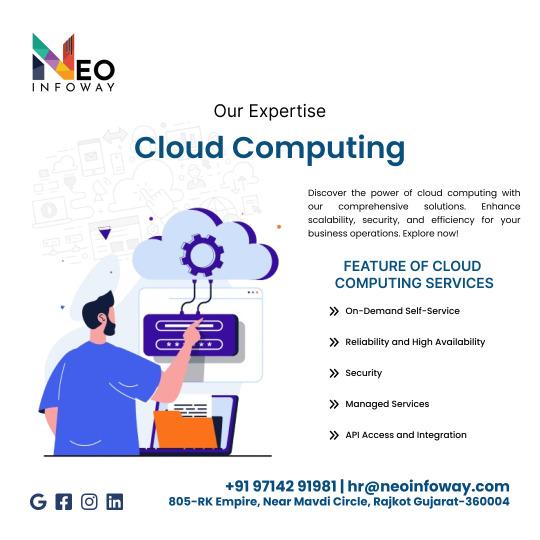
#cloudcomputing#neo#infoway#neoinfoway#cloudservices#cloudinfrastructure#cloudstorage#cloudhosting#publiccloud#privatecloud#hybridcloud#multicloud#clouddeploymentmodels#infrastructureasaservice#platformasaservice#softwareasaservice#cloudmigration#cloudsecurity#cloudarchitecture#cloudmanagement#cloudautomation#cloudscalability
0 notes
Text
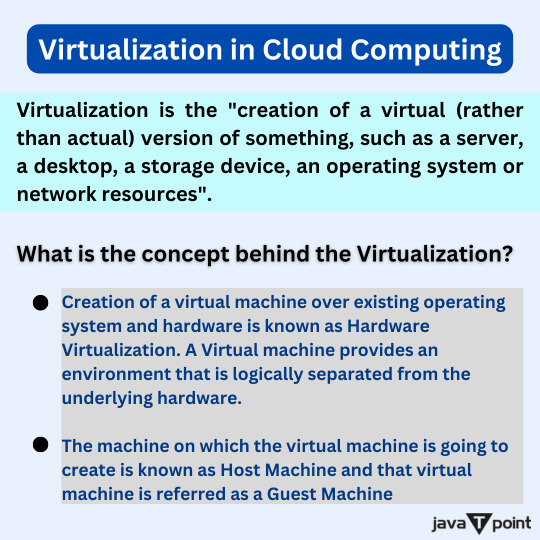
Virtualization in Cloud Computing . . . . for more information and a cloud computing tutorial https://bit.ly/4a9ymrG check the above link
#cloudcomputing#privatecloud#publiccloud#hybridcloud#virtualization#multicloud#communitycloud#computerscience#computerengineering#javatpoint
0 notes
Text
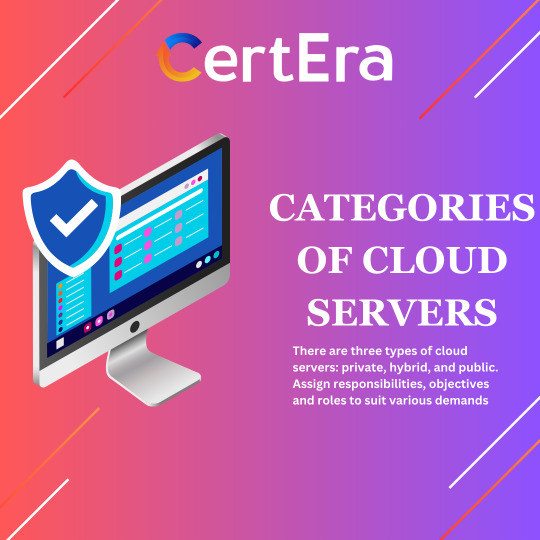
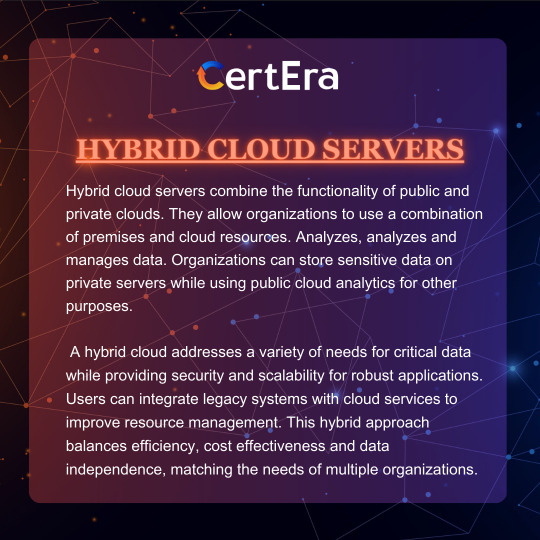
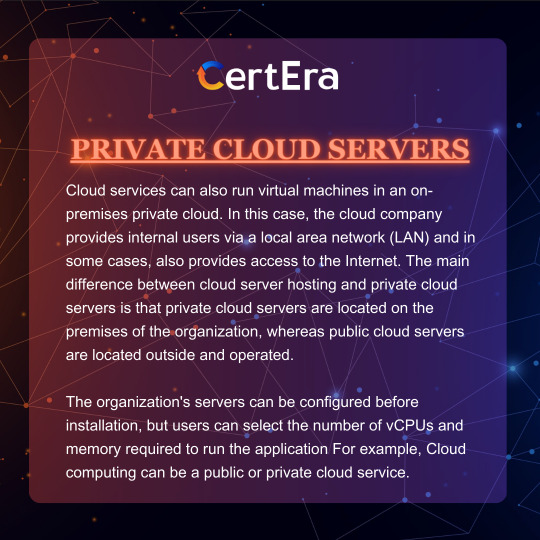
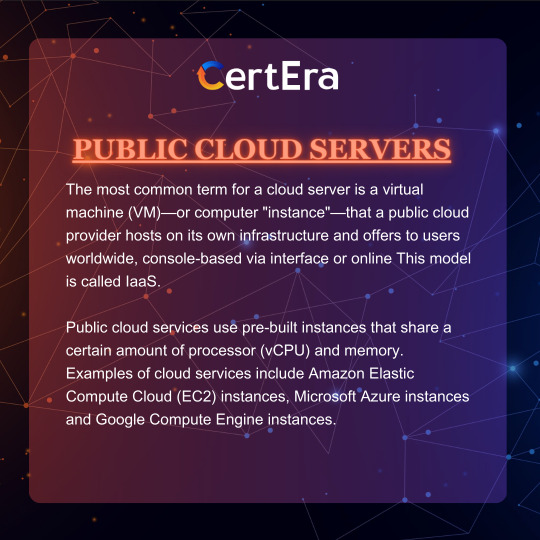
Categories of cloud servers
1 note
·
View note
Text
TikTok parent company creates KubeAdmiral for Kubernetes

While Kubernetes is still the de-facto standard in container orchestration, a lot of people who work on it would agree that it is in fact quite hard and in need of a lot of polishing. Read More. https://www.sify.com/cloud/tiktok-parent-company-creates-kubeadmiral-for-kubernetes/
#KubeAdmiral#TikTok#Kubernetes#Container#PublicCloud#PrivateCloud#KubeFed#ByteDance#Cluster#ContainerOrchestration
0 notes
Text
Public Cloud, Private Cloud, and Hybrid Cloud are distinct models with unique features. Public Cloud offers scalability and cost-effectiveness through shared resources. Private Cloud provides enhanced security and control by utilizing dedicated infrastructure. Hybrid Cloud combines the benefits of both, allowing businesses to optimize performance and flexibility. Choose the right cloud model based on your organization's specific needs and priorities.

0 notes
Text
Are you confused about the different types of cloud computing options available?
You're not alone.
We'll compare these three models to help you choose the best one for your business.
.
.
.
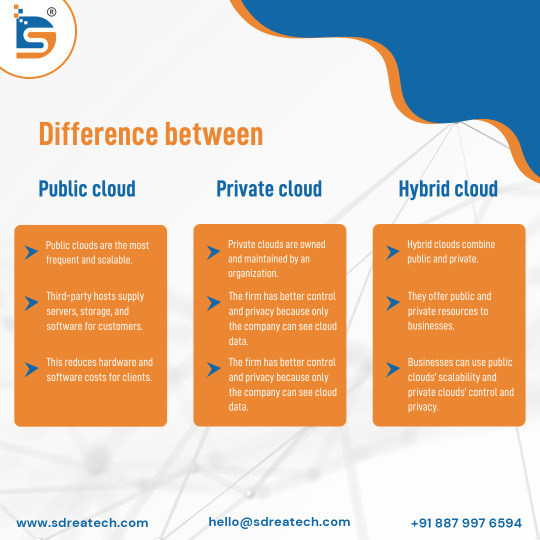
#cloudcomputing#cloudcomputingservices#PublicCloud#privatecloud#hybridcloud#websitebuilder#websiteservices#websitedeveloper#WebsiteDevelopment#technology#technologysolutions#sdreatech
0 notes
Text
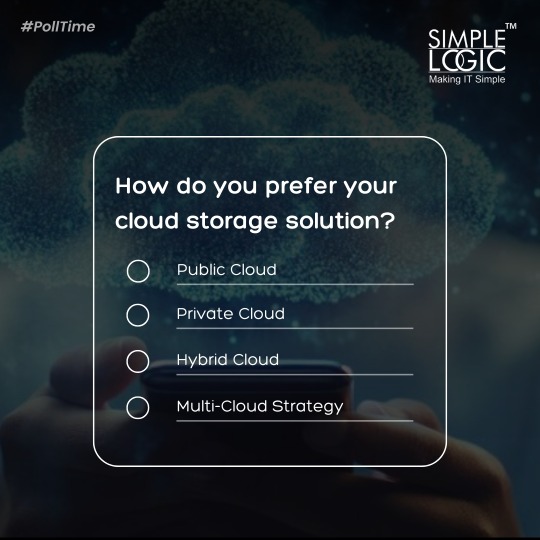
#PollTime How do you prefer your cloud storage solution?
A) Public Cloud 🌩️ B) Private Cloud 🔒 C) Hybrid Cloud 🛠️ D) Multi-Cloud Strategy 🌐
Comments your answer below👇
#simplelogic#makingitsimple#itcompany#dropcomment#manageditservices#itmanagedservices#poll#polls#itservices#itserviceprovider#itservicescompany#cloud#cloudstorage#publiccloud#privatecloud#hybridcloud#makeitsimple#simplelogicit
0 notes
Text
IBM Cloud’s DAL14 Boosts Hybrid Cloud And Data Redundancy

In Texas, everything is larger, even the footprint of the IBM Cloud Network. The tenth data center for IBM Cloud, which supports its virtual private cloud (VPC) operations, opened its doors today in Dallas, Texas. The fourth availability zone in the Dallas, Texas, IBM Cloud area is DAL14, the most recent addition. It is an addition to the current configuration, which consists of one federal data center, two network points of presence (PoPs), and one single-zone region (SZR).
DAL14
DAL14, the fourth availability zone (AZ) in the Dallas, Texas, region, is the newest addition to IBM Cloud.
The new availability zone in IBM Cloud’s Dallas area, DAL14, provides companies with a number of important advantages:
Enhanced Resilience: By dispersing applications and services over several zones, users can create highly resilient architectures using the four availability zones (including DAL14). In the event that a failure occurs in any one zone, this lowers the chance of downtime.
Scalability: In order to accommodate traffic spikes and demand surges without sacrificing performance, IBM Cloud users can scale workloads across several availability zones, including DAL14.
Data Redundancy: By offering a second geographic location inside the same region, DAL14 improves the choices for data redundancy. Ensuring that data is replicated and kept in a safe, remote location is essential for applications that need disaster recovery.
Low Latency: Dallas-area users can now execute and store data closer to their consumers by integrating DAL14. This improves response times and lowers latency, particularly for applications that need to process data quickly and in real-time.
Support for Hybrid Clouds: DAL14 facilitates the use of IBM Cloud’s security and flexibility to enable businesses to integrate cloud resources with on-premises data centers.
Strict regulatory and compliance criteria are followed by IBM Cloud, and the new zone will continue to provide strong security standards with firewall protections, encryption, and other security measures.
With this expansion, IBM Cloud’s overall capabilities in North America are strengthened, offering organizations more alternatives and flexibility when developing and implementing their cloud infrastructures.
The facility is built to support the utilization of enterprise-grade cloud computing workloads, including generative AI, secret computing, large-scale in-memory databases, and high-volume online applications with fluctuating traffic peaks.
According to Jay Jubran, Director of IBM Cloud Product Management Infrastructure Services, “the new state-of-the-art DAL14 expansion zone is a testament to our VPC growth providing additional capacity for our clients in the Dallas region and a commitment to our delivery of advanced networking solutions.” “Our customers can expand their workloads in IBM Cloud with peace of mind when they invest in our data centers.”
Refresher on terminology: zones, regions, and IBM Cloud VPC
Built on an extremely secure and robust software-defined network (SDN), IBM Cloud VPC allows you to create separate private clouds for your business needs while still enjoying the adaptable advantages of a public cloud. You select the processing, storage, and networking resources you need, and IBM Cloud offers hyperscalability and optimal availability.
Let’s take a brief look at the fundamental ideas behind zones and regions as they relate to IBM Cloud VPC setups.
Region: An abstraction associated with the geographical area where a virtual private cloud (VPC) is installed is called a region. There are several zones, or separate fault domains, within each area. A VPC can cover more than one zone in the designated area.
Zones: A zone is a physical representation of a data center that houses network, compute, and storage resources as well as the associated power and cooling systems. It also offers services and applications. To reduce latency, enhance fault tolerance, and remove shared single points of failure, zones are segregated from one another. Applications and databases are intended to be highly available, fault tolerant, and scalable through the use of availability zones.Image credit to IBM
Dallas’s cloud industry has a bright future
The Texas data center market has been expanding, and it doesn’t seem like it will slow down any time soon, much like the number of businesses relocating to the state. The Dallas data center market is estimated by Moder Intelligence to be worth 419.64 MW this year, and over the next five years, it is expected to increase at a compound annual growth rate (CAGR) of 12.7% to 941.92 MW.
The report’s market trends list COVID-19, the need for hyperscalability, the demand for hybrid clouds, and the growing acceptance of AI as some of the causes driving up cloud computing demand in Dallas.
As the amount of data generated in Dallas increases in sectors including government, financial services, telecom, and healthcare, IBM Cloud hopes to increase its networking presence in the region in response to customer and business partner requests.
DAL14’s solutions for IBM Cloud VPC
Additionally, the complete IBM Cloud VPC line will reside in DAL14. Every affordable choice is designed to meet specific needs for platform as a service (PaaS), infrastructure as a service (IaaS), and hybrid cloud, including x86 with 4th Gen Intel Xeon processing capability, VMware, SAP, and IBM Z.
For example, IBM Cloud Virtual Servers, a portfolio that includes recent news on using Intel Gaudi 3 AI accelerators, will be housed at the new multizone region (MZR) site. IBM Cloud Direct Link, IBM Cloud Block and File Storage, IBM Cloud Bare Metal Servers for VPC, and other features will also be supported. With seven MZRs in all and eighteen availability zones constructed to specification for fast access, low latency, low cost migration, and certified security, the complete range is global in scope.
Resiliency, performance, security, and compliance are at the heart of IBM Cloud’s commitment to supporting clients and enterprises who are expanding their operations to Dallas and other metro areas in the greater southwest region.
Read more on govindhtech.com
#IBMCloud#DAL14Boost#HybridCloud#DAL14#DataRedundancy#IBMCloudNetwork#generativeAI#publiccloud#IBMCloudVPC#x86#intel#news#technology#technews#IBMCloudVirtualServers#Gaudi3AIaccelerators#govindhtech
0 notes